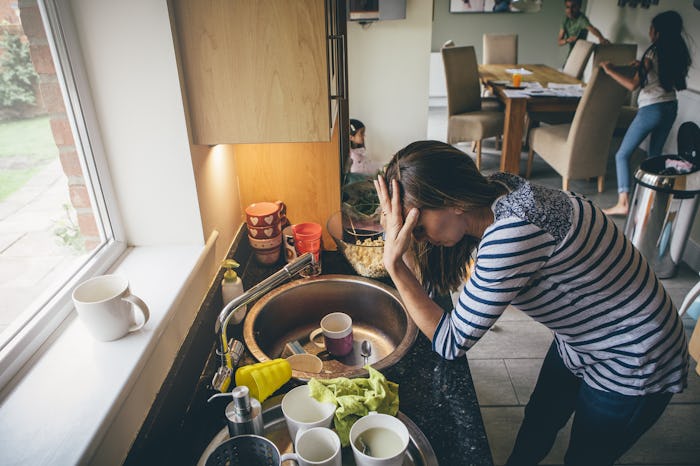Becoming a mom comes with so many challenges, many that you likely didn't know even exist. Each mother's own experience is unique, and deserves respect. Whether you're dealing with postpartum depression, or a specific infection, or anything in between, you're not alone. And for those moms who are struggling with postpartum anxiety, one mom in particular is here to share her own experiences. Seriously, all moms should read this incredible essay about postpartum anxiety, because it might help explain some things you're feeling.
In a moving essay for New York Magazine's The Cut, Sarah Bregel opens up about her own struggles with postpartum anxiety, describing it as a "lonely terror." Bregel discusses the research behind what postpartum anxiety is, and how it is medically different than postpartum depression. Postpartum anxiety, Bregel writes, "often goes undiagnosed, because everyone, even doctors, expects new mothers to experience heightened anxiety." Bregel quotes research from Karen Kleiman, the founder and director of The Postpartum Stress Center, who states that postpartum anxiety affects 15 percent of new moms, and that there is a distinct difference between a healthy, "new mom worry," and a serious medical condition.
Many aren't even aware that they have postpartum anxiety. As Bregel writes of her feelings of intense worry,
This happened the last time, too. A few months after my first child’s birth — months filled with panic, a chest full of pressure, and heart palpitations — a doctor finally explained that no, there was nothing wrong with my heart. I had postpartum anxiety, and the intrusive, horrifying thoughts were one more symptom.
Postpartum anxiety is clearly something that can have a huge impact on a new mother's mental, physical, and emotional health. For Bregel, those feelings of anxiety were beginning to turn "toxic."
I am on high alert all the time these days. I tell myself that this panicky feeling is normal — I have a new(ish) baby, after all. But it doesn’t feel normal. I have constant visions of my son suffocating in the night. I think of waking up to his cold body. I spend nights imagining a thousand unlikely, tragic things that could happen to him.
According to Bregel, "levels of oxytocin rise during pregnancy; the hormone, which promotes bonding, also triggers heightened levels of activity in areas of the brain linked to empathy and, yes, anxiety." So while it makes sense that many new moms experience postpartum anxiety, on a scientific level, it doesn't mean it should be ignored.
According to Postpartum Support International, there are several symptoms of postpartum anxiety that moms should be looking out for:
Constant worry
Feeling that something bad is going to happen
Racing thoughts
Disturbances of sleep and appetite
Inability to sit still
Physical symptoms like dizziness, hot flashes, and nausea
So, whether it has impacted you personally or not, postpartum anxiety is clearly a serious condition, and one that requires proper diagnosis. As Bregel wrote,
While there may be no way to fully prepare for developing postpartum anxiety — a fact I learned firsthand — there are proven ways to cope with it.
And hopefully, any mom struggling with postpartum anxiety can find the right support to help her deal with it.
